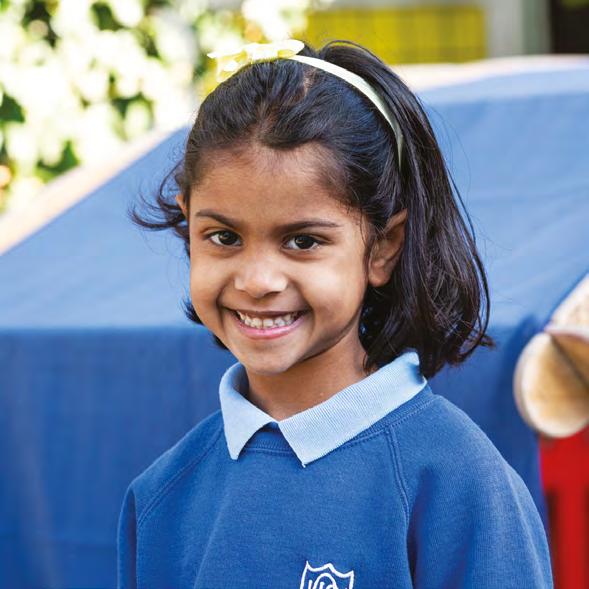Topics
In the autumn term the first Nursery topic is ‘All about me’/’Shape and colour’. The children explore a range of activities to help them get to know their peers and teachers. Children will be encouraged to talk about themselves and their personal interests. We always plan around children’s interests and ensure the resources we use reflect all of the children’s individual interests and ideas.
In the autumn term, the Lower 1 topic is ’All about me’/’ The five senses’. The children will look at the changes in their growth as well as explore the five senses. In the second half term we will learn about Special festivals and celebrations leading up to Christmas.
At Orchard House School we believe that it is important to follow children’s interests. We plan many activities and lessons around these topics, but we also ensure our planning and provision facilitates learning based on children’s individual interests and ideas.
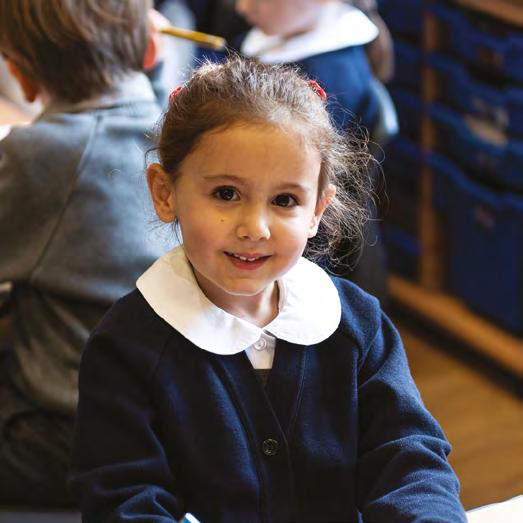
3 CURRICULUM OVERVIEW: EYFS
Nursery
Communication and Language
• Using a wider range of vocabularylearning new vocabulary.
• Communication skills with peers and adults.
• Questions and instructions.
• Rhymes and songs.
• Listening and communication skills.
Physical Development
• Developing fine motor skills.
• Developing gross motor skills outdoors.
• Cutting skills.
• Pencil control and tripod grip.
• P.E lessons.
Personal, Social and Emotional development
• Social communication skills.
• Developing new friendships.
• Select and use resources independently.
• Exploring feelings.
• Working as a team.
• Resolving conflict - Montessori Peace table.
• Healthy eating/taking care of our teeth/exercise.
Literacy
• Exploring a range of fiction and non-fiction books and developing comprehension and language skills
• Synthetic phonics.
• Phonics Montessori activities.
• Fine motor development activities - pencil control and pencil grip.
• Name tracing/writing activities.
Ideas for Home
• Sharing stories at home. Talking about books to develop children’s comprehension skills.
• 1:1 reading time using resources provided by teaching team.
• Drawing pictures
• Playdough activities to develop fine motor skills.
• Counting toys and ordering from largest to smallest.
• Role-play school. Children love to be the teacher!
• Talk time at home. Making time to have meaningful conversations at home is excellent for language and communication skills.
• Helping with little jobs at home. Taking responsibility to tidy away my toys/ setting the table for dinner/pouring my cereal and milk.
• Putting on my clothes/shoes and coat.
• Going on a nature walk. What can I see? What can I hear? What can I smell?
• Soft play - excellent for developing gross motor skills.
• Gardening activities at homedeveloping an appreciation for the natural environment.
• Healthy cooking at home.
4
Mathematics
• Counting skills.
• Number recognition/ordering/1:1 correspondence activities.
• Real life mathematical number problems with numbers.
• 2D shape activities.
• Repeating patterns.
• Comparing length/quantity.
• Developing mathematical language skills.
Understanding the World
• Diversity
• Family and community
• Natural world
• Festivals of the world
• Technology
Expressive Arts and Design
• Singing a range of songs
• Imaginative play
• Role-play activities
• Exploring texture and colour
• Small world activities - developing story-telling skills.
*All areas of learning are reinforced by a range of Montessori activities for children to select during independent learning time.
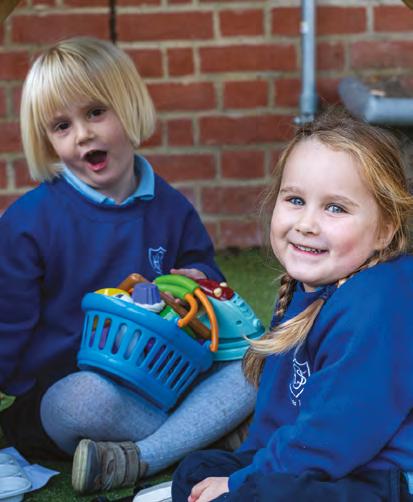
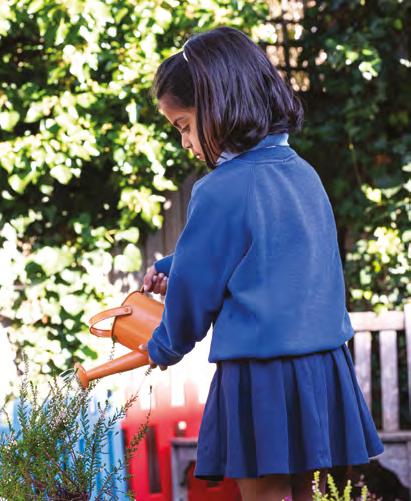
CURRICULUM OVERVIEW: EYFS 5
Specialist Teaching
PE
The children will learn and explore:
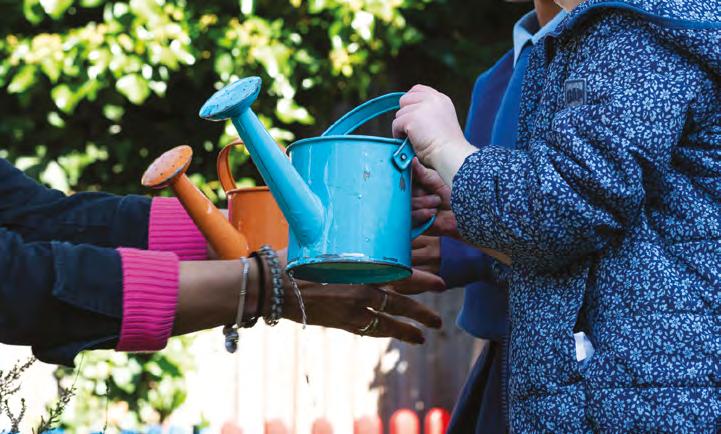
• Handling of objects and movement.
• The basics of agility, balance, and coordination through a variety of games and activities.
• Different ways their body can move and understand how to move safely and negotiate space.
Computing
• Educational games on the iPad
• Technology toys
Eurythmics
Children will learn to…
• Follow music freely.
• Identify changes in speed and dynamics.
• Participate in musical games, showing an awareness of phrasing and creative ideas.
• Eurythmics
6
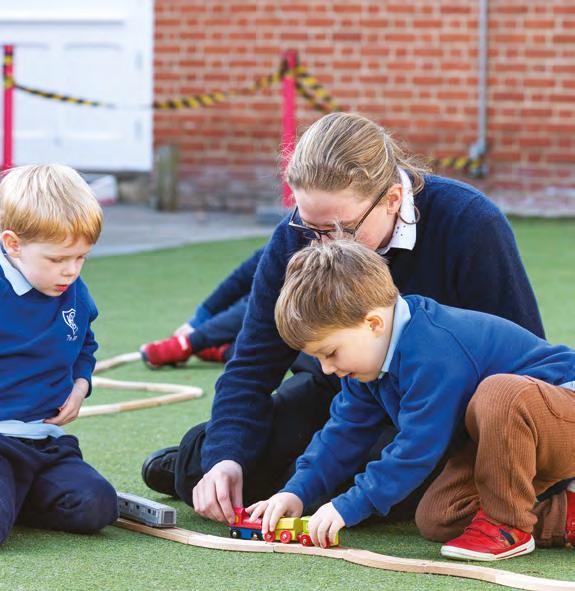
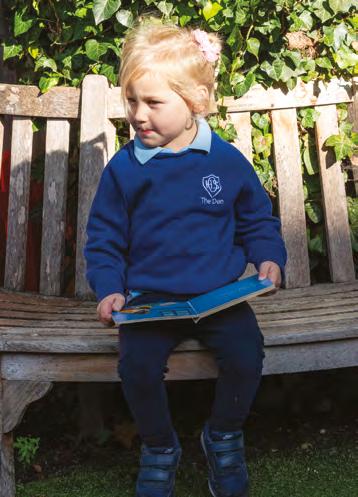
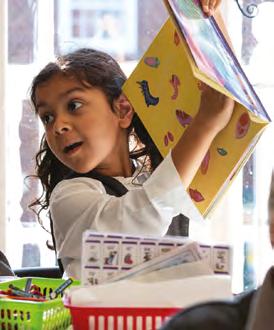
7 CURRICULUM OVERVIEW: EYFS
Lower 1
Communication and Language
Listening, Attention and Understanding ELG Children at the expected level of development will:
• Listen attentively and respond to what they hear with relevant questions, comments and actions when being read to and during whole class discussions and small group interactions.
• Make comments about what they have heard and ask questions to clarify their understanding.
• Hold conversation when engaged in back-and-forth exchanges with their teacher and peers.
Speaking ELG Children at the expected level of development will:
• Participate in small group, class and one-to-one discussions, offering their own ideas, using recently introduced vocabulary.
• Offer explanations for why things might happen, making use of recently introduced vocabulary from stories, non-fiction, rhymes and poems when appropriate; -
• Express their ideas and feelings about their experiences using full sentences, including use of past, present, and future tenses and making use of conjunctions with modelling and support from their teachers.
Managing Self ELG Children at the expected level of development will:
• Be confident to try new activities and show independence, resilience, and perseverance in the face of challenge.
• Explain the reasons for rules, know right from wrong and try to behave accordingly.
• Manage their own basic hygiene and personal needs, including dressing, going to the toilet, and understanding the importance of healthy food choices.
Building Relationships ELG Children at the expected level of development will:
• Work and play cooperatively and take turns with others.
• Form positive attachments to adults and friendships with peers.
• Show sensitivity to their own and to others’ needs.
Physical Development
Gross Motor Skills ELG Children at the expected level of development will:
• Negotiate space and obstacles safely, with consideration for themselves and others.
• Demonstrate strength, balance and coordination when playing.
• Move energetically, such as running, jumping, dancing, hopping, skipping, and climbing.
8
Personal, Social and Emotional Development
Self-Regulation ELG Children at the expected level of development will:
• Show an understanding of their own feelings and those of others and begin to regulate their behaviour accordingly.
• Set and work towards simple goals, being able to wait for what they want and control their immediate impulses when appropriate.
• Give focused attention to what the teacher says, responding appropriately even when engaged in activity, and show an ability to follow instructions involving several ideas or actions.
Fine Motor Skills ELG Children at the expected level of development will:
• Hold a pencil effectively in preparation for fluent writing – using the tripod grip in almost all cases.
• Use a range of small tools, including scissors, paint brushes and cutlery.
• Begin to show accuracy and care when drawing.
Literacy
Comprehension ELG Children at the expected level of development will:
• Demonstrate understanding of what has been read to them by retelling stories and narratives using their own words and recently introduced vocabulary.
• Anticipate – where appropriate – key events in stories.
• Use and understand recently introduced vocabulary during discussions about stories, non-fiction, rhymes, and poems and during role-play.
• Word Reading ELG Children at the expected level of development will:
• Say a sound for each letter in the alphabet and at least 10 digraphs.
• Read words consistent with their phonic knowledge by sound-blending.
• Read aloud simple sentences and books that are consistent with their phonic knowledge, including some common exception words.
Writing ELG Children at the expected level of development will:
• Write recognisable letters, most of which are correctly formed.
• Spell words by identifying sounds in them and representing the sounds with a letter or letters.
• Write simple phrases and sentences that can be ready by others.
9 CURRICULUM OVERVIEW: EYFS
Mathematics
• Number ELG Children at the expected level of development will:
• Have a deep understanding of number to 10, including the composition of each number.
• Subitise (recognise quantities without counting) up to 5.
• Automatically recall (without reference to rhymes, counting or other aids) number bonds up to 5 (including subtraction facts) and some number bonds to 10, including double facts.
Numerical Patterns ELG Children at the expected level of development will:
• Verbally count beyond 20, recognising the pattern of the counting system.
• Compare quantities up to 10 in different contexts, recognising when one quantity is greater than, less than or the same as the other quantity; Explore and represent patterns within numbers up to 10, including evens and odds, double facts and how quantities can be distributed equally.
Understanding the World
Past and Present ELG Children at the expected level of development will:
• Talk about the lives of the people around them and their roles in society.
• Know some similarities and differences between things in the past and now, drawing on their experiences and what has been read in class.
• Understand the past through settings, characters and events encountered in books read in class and storytelling.
People Culture and Communities ELG Children at the expected level of development will:
• Describe their immediate environment using knowledge from observation, discussion, stories, non-fiction texts, and maps.
• Know some similarities and differences between different religious and cultural communities in this country, drawing on their experiences and what has been read in class.
• Explain some similarities and differences between life in this country and life in other countries, drawing on knowledge from stories, non-fiction texts and – when appropriate – maps.
The Natural World ELG Children at the expected level of development will:
• Explore the natural world around them, making observations and drawing pictures of animals and plants.
• Know some similarities and differences between the natural world around them and contrasting environments, drawing on their experiences and what has been read in class.
• Understand some important processes and changes in the natural world around them, including the seasons and changing states of matter.
10
Expressive Arts and Design
Creating with Materials ELG Children at the expected level of development will:
• Safely use and explore a variety of materials, tools, and techniques. experimenting with colour, design, texture, form, and function.
• Share their creations, explaining the process they have used.
• Make use of props and materials when role playing characters in narratives and stories.
Being Imaginative and Expressive ELG Children at the expected level of development will:
• Invent, adapt, and recount narratives and stories with peers and their teacher.
• Sing a range of well-known nursery rhymes and songs.
• Perform songs, rhymes, poems, and stories with others, and – when appropriate try to move in time with music.
*All areas of learning are reinforced by a range of Montessori activities for children to select during independent learning time.
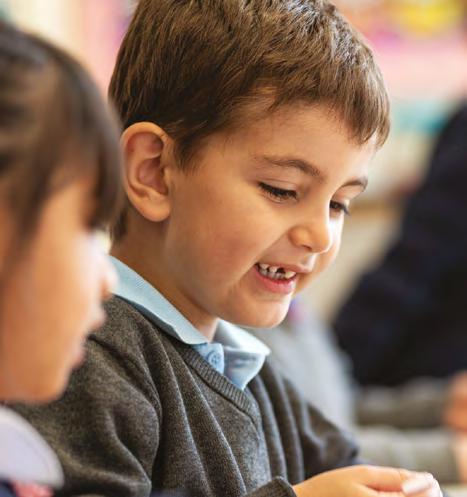
Ideas for Home
• Sharing stories at home. Talking about books to develop children’s comprehension skills.
• 1:1 reading time using resources provided by teaching team.
• Drawing pictures.
• Playdough activities to develop fine motor skills.
• Counting toys and ordering from largest to smallest.
• Role-play school. Children love to be the teacher!
• Talk time at home. Making time to have meaningful conversations at home is excellent for language and communication skills.
• Helping with little jobs at home. Taking responsibility to tidy away my toys/ setting the table for dinner/pouring my cereal and milk.
• Putting on my clothes/shoes? Socks and coat.
• Going on a nature walk. What can I see? What can I hear? What can I smell?
• Soft play - excellent for developing gross motor skills.
• Gardening activities at home - developing an appreciation for the natural environment.
• Healthy cooking at home.
• Helping with laying the table.
• Use a knife and fork at mealtimes.
• Brush their own teeth.
• Pack their school bag.
• Visiting the local library.
• Help to make a shopping list.
• Tidy away the toys.
• Learn to wipe themselves after going to the bathroom.
11 CURRICULUM OVERVIEW: EYFS
Specialist Teaching
The children will learn and explore:
• Reintroduction of understanding how to safely move and negotiate space.
• How to participate in a competitive game and to understand it is okay to be tagged.
• The concept of coordination, balance, and agility.
• Balancing different objects on different parts of the body and be able to move whilst carrying objects.
French
The children will learn and explore:
• Sing, dance and play whilst absorbing French vocabulary.
• Play games to use the new language in a fun context and get confidence at speaking.
• Sing traditional songs and perform rhymes to learn the language and embed the correct intonation and pronunciation.
• Read story books and get exposed to simple language and absorb French vocabulary.
Computing
• The children continue to use technology toys to start to explore algorithms.
• The children use iPads with a range of educational apps.
• We introduce the pupils to laptops to enable them to navigate the laptop and to use the keyboard and trackpad.
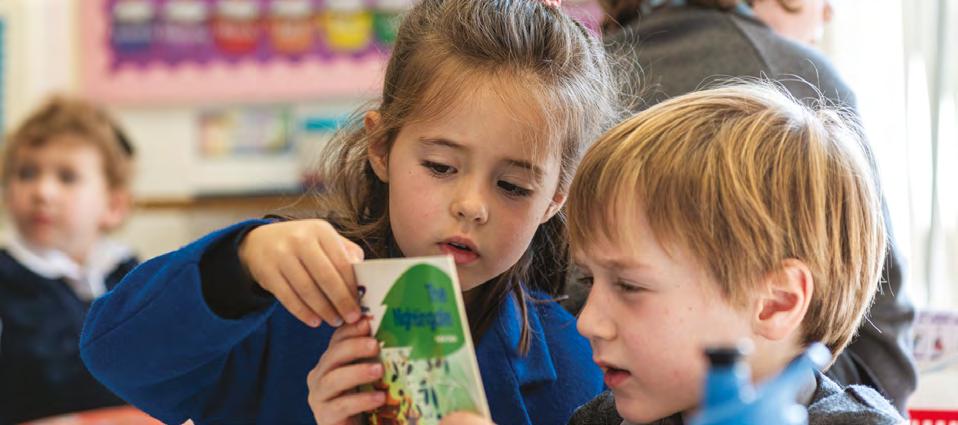
12
Eurythmics
Children will learn to…
• Follow music freely.
• Recognise note values learnt in the Nursery, including dotted quavers, using them as different characters of people in the park: Minims = lazy gardeners; Crotchets = grown-ups; Quavers = joggers; Dotted quavers = children; Semi-quavers = dogs.
• Participate in exercises and games showing an awareness of phrasing and melody.
• Participate in exercises in inhibition and incitation to encourage quick reaction.
Music
• Musicianship through singing.
• Sing echo songs and rhymes and perform movements to a steady beat.
Rhymes
• Chop Chop
• Engine Engine
• Five Little Peas
• Slowly Slowly very Slowly
• Soft Kitten
• Teddy Bear
Singing
• All the Little Ducks
• Cobbler Cobbler
• Rain is Falling Down
• See Saw
• Slowly Slowly very Slowly
• Snail Snail
• Tick Tock
Nativity
• Sing individually and in a group.
• Perform to an audience.
• Rehearse and improve their work.
13 CURRICULUM OVERVIEW: EYFS
Orchard House School 16 Newton Grove, Chiswick London , W4 1LB
